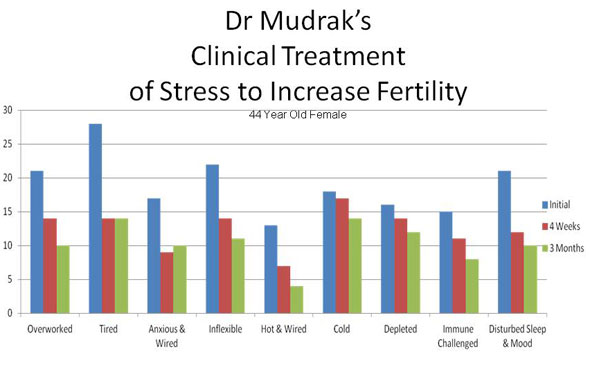Stress and Fertility
Stress exists in most of our lives, and most especially in our reproductive lives. Stress is one of the greatest strains on our reproductive systems, especially once there has been a diagnosis of "infertility". It is very stressful for a couple to experience such a great unfulfilled desire, and this stress tends to be perpetuating and further taxing to the body, mind and spirit unless it is directly and effectively addressed. Acupuncture is a powerful intervention and treatment for stress and Dr. Mudrak is recognized for her success and expertise in holistically treating stress.

Is there proof that stress affects fertility?
An extensive study by the Univerity of California, San Deigo in 2001 set out to specifically look at the effects of stress on sexual reproduction, by comparing stress levels of women to the the rate of achieved pregnancy and live birth. The study examined the success rates of a group of women who were undergoing some form of Assisted Reproductive Technology (ART), either gamete intrafallopian transfer (GIFT) or in vitro fertilization (IVF). In summary, the study found that the women who scored highest on the life stress levels were 93 percent less likely to become pregnant and achieve a live birth than the women in the study who were identified as having lower life stress.
How does stress affect fertility?
Stress stimlulates the sympathetic nervous system and puts the body into "fight or flight" mode. This response is a great adaption to escape wild animals, but not a good response for relaxation and reproduction. Specifically, stress invokes the sympathetic nervous system and increases the hormone cortisol, which acts to increase heart and resiratory rate, blood pressure, muscle tension and dilate the pupils, while simultaneously acting to inhibit the reproductive and digestive functions. Adrenaline (a hormone released by the adrenal glands during stress) inhibits the body's production of progesterone, a primary reproductive hormone.
Stress Decreases Blood Supply to the Reproductive Organs
Stress triggers the sympathetic nervous system to heighten a person's awareness of danger and promote the "fight or flight" impulse by increasing blood flow to the legs and arms, brain and eyes. It shunts blood away from the gastrointestinal, reproductive and endocrine systems because these systems are nonessential to the "flight or fight" response.
The uterus and ovaries experience consistent, diminished blood flow when a woman is consistently stressed, resulting in fertility problems. Likewise, a man's reproductive organs experience diminished blood flow, and reduced fertility under stress. Stress and the stimulation of sympathetic nervous system's "flight or fight" response are counterproductive to reproduction functions for both men and women.
What Treatment Paradigms Empower Us
in Addressing Stress?

Stress and Reduced Fertility—a Vicious Cycle
The "fight or flight" response is designed to be triggered occasionally. However, our modern lifestyle triggers it frequently, in some cases constantly (the phone just never stops ringing, I had to skip lunch again today, etc.) making the response "overactive" rather than properly reactive. This chronic distress can be a factor in causing stress-related health problems. The stress-distress cycle perpetuates itself when the health-related problems lead to decreased reproductive function and delayed conception. The delayed conception is a trigger which again perpeptuates the stress and health-related problems decreasing fertility.
How can you change your stress response to increase your fertility?
Acupuncture is a powerful intervention and treatment for stress. Dr. Mudrak is recognized by her colleagues for her expertise in the treatment of stress with acupuncture, herbs and nutraceuticals, and she presents at medical conferences on the subject.

